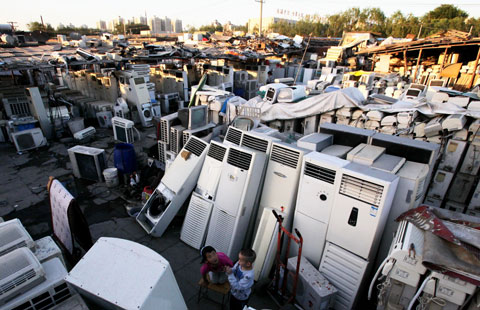Farm workforce withers as young people leave
By He Na and Han Junhong (China Daily) Updated: 2012-02-29 08:20Improving lives
Ji Chunyan's family is among those already benefiting from the land transfer system in Daling.
After renting adjoining pieces of land from her brother and sister, both migrant workers, she built five greenhouses to grow high-quality vegetables. She now supplies produce and seedlings to Wal-Mart supermarkets, among others, and can earn up to 200,000 yuan a year.
"If it wasn't for the land I rent (slightly more than 2 hectares), my family would still be struggling with debts," said Ji, 47. "Even though my husband and I worked day and night, our lives before were very hard, especially as we had two sons at college.
"Farmers can't get rich simply growing crops on the land given to them, especially as the government subsides are often swallowed up by sharp increases in the prices of seeds, fertilizer and agricultural tools."
Another beneficiary of the system is Yan Rong, who began renting abandoned land in Linxi village when people left for jobs in coastal cities or in South Korea.
By carefully choosing the right locations for different crops corn in higher spots and rice in waterlogged fields his total output rose to 100,000 kilograms. He said that with cash in his pocket, he was able to invest in machinery to increase productivity, as well as add a fishpond and a sty for more than 200 pigs.
Although younger people are keen on the idea of renting land, convincing elderly farmers to play silent landlords can be more difficult.
Li Shixun is 65 years old, yet he said he has no intention of letting anyone else use his 0.7 hectares. "I've been living in the countryside all my life," said the farmer, whose four daughters all have stable jobs in the city. "I'd feel uncomfortable in the city, so as long as I can walk I'll take care of the land myself."
Learning lessons
Rong Tingzhao at the Chinese Academy of Engineering is an advocate of the ranch model transferring land on a voluntary and compensatory basis to develop scale operations and said he believes it is an "inevitable demand of modern agricultural development".
In a recent essay, Zhang Zhizhong, an agricultural expert at the State Council's Development Research Center, also suggested authorities revise the rules on rural-land contract management to ease labor shortages.
Meanwhile, officials in Huoqiu, a county in East China's Anhui province, have set up 32 crop-protection teams professionals with training in agriculture to help farmers in their fields and offer advice. Many provinces are now attempting to learn from the experience.
"The future of farming is well-educated professionals who have a good grasp of agriculture and marketing techniques," said Yao, head of Daling town. "They are vital to securing China's crop supplies."
Contact the reporter at hena@chinadaily.com.cn
- Seven villagers murdered in N China
- China steps up tobacco control efforts
- Five jailed for separatism in Xinjiang
- Letter asks for leniency in poisoning case
- Antibiotics in surface water pose 'indirect health risk'
- Tianjin airport opens up transit link to Beijing
- High levels of antibiotics in China's major rivers
- China to dig tunnel for Asian rail system
- Bering strait line to US possible, experts say
- China: Stop oil rig harassment







